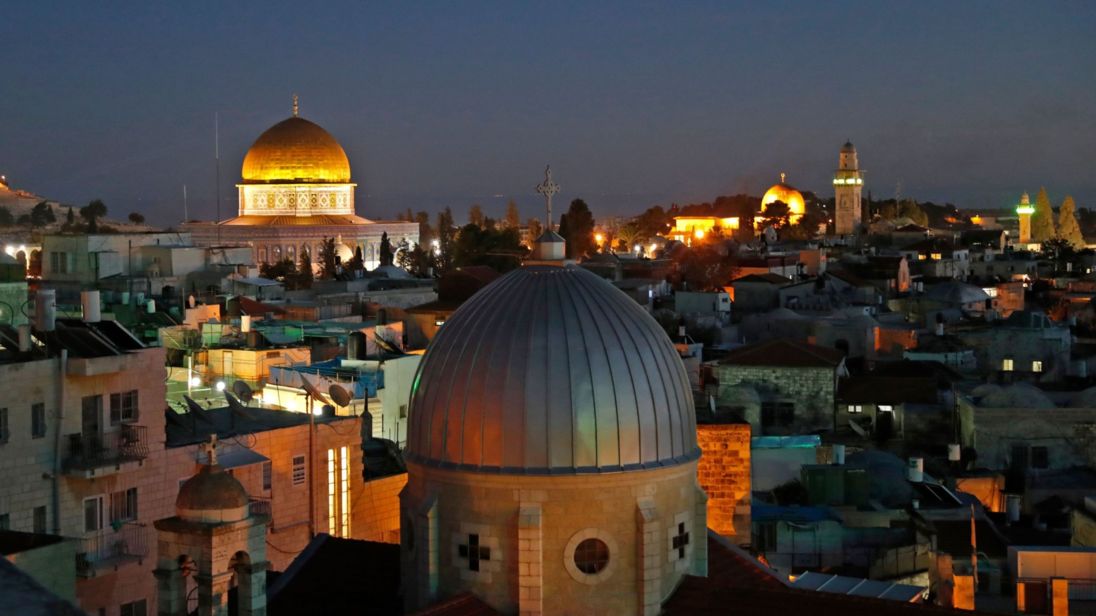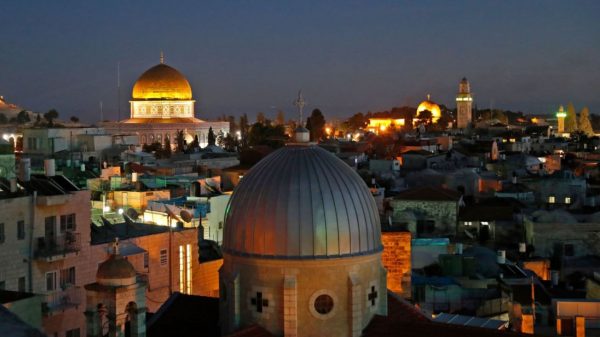
AHMAD GHARABLI/AFP/Getty Images)
President Trump has reportedly told Palestinian leader Mahmoud Abbas that the U.S. will move the U.S. Embassy in Israel from Tel Aviv to Jerusalem.
A spokesman for Abbas said Trump made the announcement in a phone call Tuesday, and that news has been confirmed by a tweet from the Palestinian Liberation Organization.
“President Mahmoud Abbas received a phone call from U.S. President Donald Trump in which he notified the president of his intention to move the American Embassy to Tel Aviv to Jerusalem,” Abbas spokesman Nabil Abu Rdainah said in a press release.
The Times also reports King Abdullah II of Jordan received a similar message from Trump.
The White House confirmed President Trump spoke by phone with the leaders of Israel, Jordan, Egypt, Saudi Arabia and the Palestinian Authority and he reaffirmed his commitment to going forward with Israeli-Palestinian peace talks. They also discussed potential decisions regarding Jerusalem.
At the White House briefing this afternoon, Press Secretary Sarah Sanders would not confirm the president has decided to move the embassy to Jerusalem and said she did not want to ‘get ahead’ of an announcement planned for Wednesday.
When asked if Trump has reached a decision, she replied, “The president is pretty solid in his thinking at this point.”
In reply to a question by CBN’s David Brody about how the president reached his decision, she said it was a “thoughtful, interagency process.”
Palestinian Hamas leader Ismail Haniyeh says relocating the U.S. Embassy to Jerusalem “breaks red lines.” He’s threatening that any decision by the Trump administration to recognize the city as Israel’s capital would be “igniting the spark of rage against the occupation.”
The U.S. Consulate in Jerusalem says that since the Palestinians are calling for three days of rage, they’re warning U.S. citizens to avoid traveling in certain areas of Israel:
“With widespread calls for demonstrations beginning December 6 in Jerusalem and the West Bank, U.S. government employees and their family members are not permitted until further notice to conduct personal travel in Jerusalem’s Old City and in the West Bank, to include Bethlehem and Jericho.”
The Trump administration is planning an official announcement about the status of the embassy on Wednesday, including possibly recognizing Jerusalem as the capital of the Jewish state.
The Palestinian Authority and Arab governments have said that moving the embassy would cause unrest in the region.
Abbas warned Trump of the “dangerous consequences such a decision would have to the peace process and to the peace, security and stability of the region and the world,” Rdainah said.
Trump is also supposed to talk with Israeli Prime Minister Benjamin Netanyahu and Jordan’s King Abdullah today.
The news of President Trump potentially recognizing Jerusalem as the capital of Israel is sure to cause instability in the region.
Turkey’s president Recep Tayyip Erdoğan has described the status of Jerusalem as a “red line” for Muslims that could lead to his country severing diplomatic relations with Israel. The European Union has also warned of “serious repercussions.”
The Palestinians said they would also cut off contacts with U.S. diplomats. And Saudi Arabia, a key U.S. ally in the region, cautioned against doing anything that would “obstruct the ongoing efforts to revive the peace process.”
Controversial
Trump’s pledge to declare Jerusalem as the capital of Israel has caused controversy across the world.
So why is moving the embassy such a big deal?
When did that change?
Have any countries ever had their embassy in Jerusalem?
But in July of 1980, Israel passed a law that declared Jerusalem the united capital of Israel. The United Nations Security Council responded with a resolution condemning Israel’s annexation of East Jerusalem and declared it a violation of international law.
So countries moved their embassies out of the city?
What about consulates?
Just to be clear: What is America’s position?
In 1989, Israel began leasing to the US a plot of land in Jerusalem for a new embassy. The 99-year lease cost $1 per year. To this day, the plot has not been developed.


Leave a Reply
You must be logged in to post a comment.